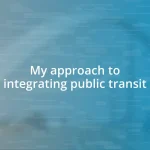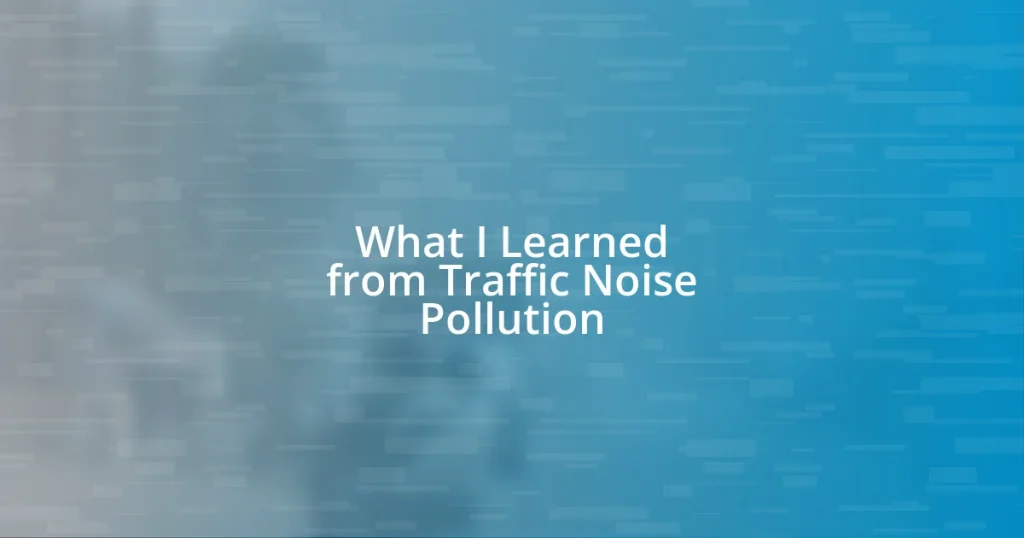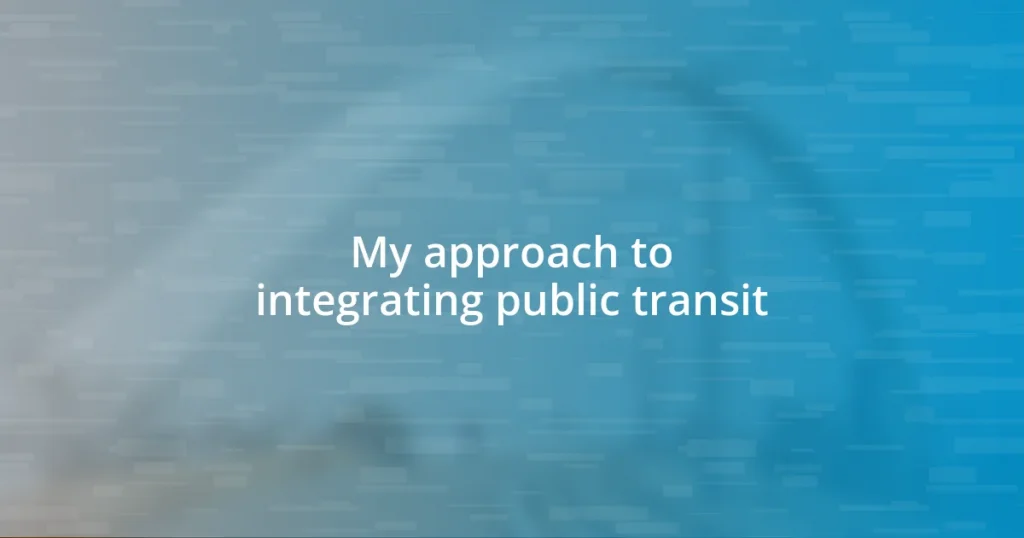Key takeaways:
- Chronic exposure to traffic noise pollution affects both mental and physical health, leading to increased stress, sleep disturbances, and cardiovascular issues.
- Mitigation strategies include planting trees, soundproofing homes, and engaging in community initiatives to address noise pollution collectively.
- Technology offers innovative solutions such as noise-canceling headphones and smart sound monitoring systems to help individuals manage noise pollution effectively.
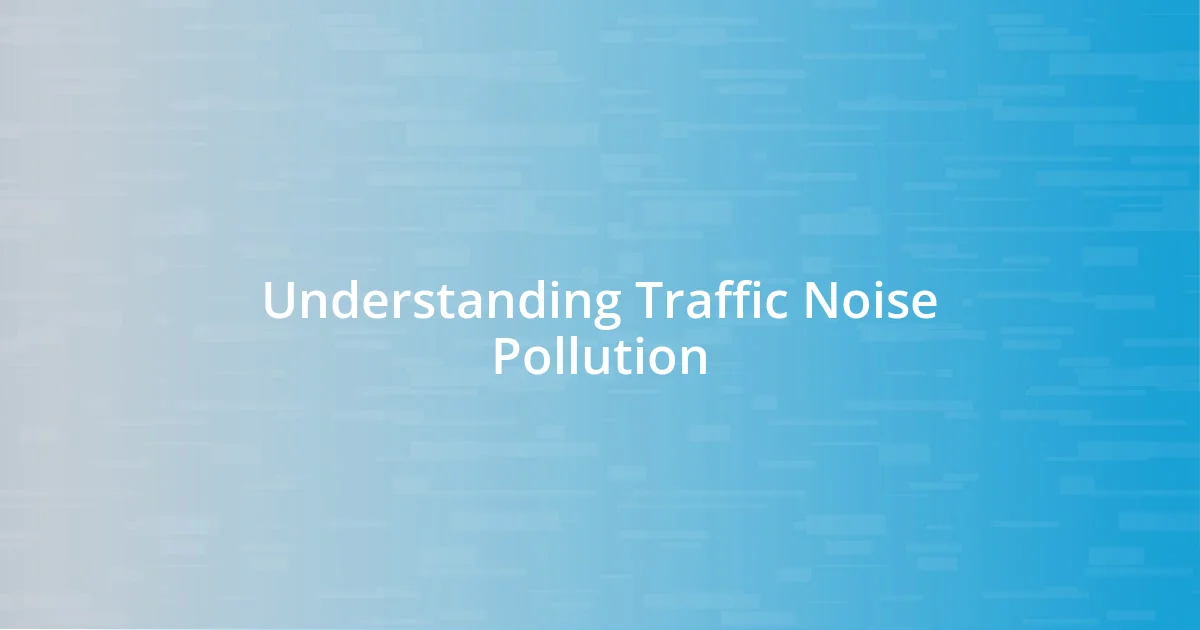
Understanding Traffic Noise Pollution
Traffic noise pollution is a pervasive issue that many of us underestimate. I recall living near a busy street, where the hum of vehicles became an unwelcome soundtrack to my life. Have you ever tried to enjoy a quiet evening, only to be interrupted by the blaring of horns and the roar of engines? It’s exhausting and can wear down even the most patient person.
This constant auditory barrage doesn’t just bother our ears; it affects our overall well-being. Studies suggest that chronic exposure to noise can lead to stress, sleep disturbances, and even heart problems. I often think about how I felt fatigued every morning after a night filled with honks and sirens. It made me question how many others are impacted similarly, yet remain unaware of the potential health implications.
Moreover, it’s fascinating to consider how traffic noise doesn’t discriminate by age or location; young children, the elderly, and everyone in between can be affected. I’ve often wondered: what can we do to mitigate this? Simple alterations in urban planning, like planting trees or sound barriers, could create a more serene environment. Isn’t it worth exploring these options to reclaim our peace?

Effects on Mental Health
Living in a noisy environment can really take a toll on our mental health. I remember a period when my evenings felt like a battle against the relentless sound of traffic. After long days at work, rather than unwinding, I found myself on edge, frequently irritated by the constant noise. It made activities like reading or meditating nearly impossible. Over time, I noticed subtle changes in my mood; I felt more anxious and less able to concentrate on simple tasks.
The effects of traffic noise pollution on mental health are substantial and often overlooked. Here’s a quick look at some of the key impacts I’ve observed and researched:
- Increased Stress Levels: The constant noise can trigger the body’s stress response, leading to heightened anxiety.
- Sleep Disruptions: Nights filled with noise often result in poor sleep quality, leaving me feeling drained each morning.
- Reduced Cognitive Function: I found it hard to focus on tasks, as persistent background noise can impair memory and attention.
- Emotional Disturbances: Irritability and mood swings became more common for me, often stemming from the fatigue induced by noisy surroundings.
- Social Withdrawal: I noticed that the overwhelming noise left me less inclined to spend time outdoors or socialize—who wants to chat amidst honking horns?
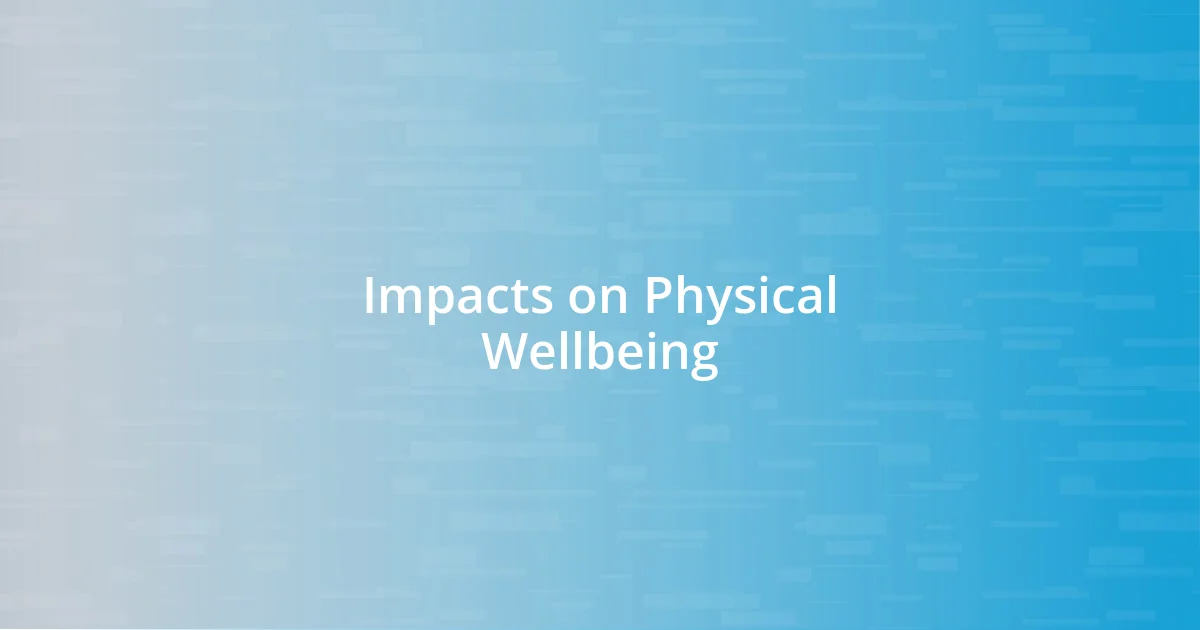
Impacts on Physical Wellbeing
The impacts of traffic noise pollution on physical well-being are profound and often insidious. From my experience, I can truly say that the unrelenting noise from nearby roads contributed to physical symptoms I hadn’t anticipated. For instance, I often felt an increased heart rate and tension in my shoulders after evenings filled with noise. It’s as if my body was constantly on alert, fueled by the mechanical symphony of cars and buses.
Long-term exposure can lead to more serious conditions, such as hypertension and even cardiac problems. There have been moments when I realized my daily headaches were more than just stress. They often coincided with particularly noisy days. The connection was clearer when I learned that studies have shown a correlation between noise pollution and increased blood pressure. Isn’t it alarming how something as seemingly innocuous as noise can shape our physical health?
Additionally, my sleep patterns took a hit, which led to a vicious cycle of fatigue and irritability. Have you ever woken up feeling more tired than when you went to bed? I often found myself tossing and turning, unable to find any reprieve from the chaos outside. Unfortunately, this not only affected my mood but my overall health as well—prolonged sleep disturbances can hamper recovery from illnesses and affect immune function. It’s a reminder that the soundscapes we live in have tangible effects on our bodies.
| Impact | Description |
|---|---|
| Increased Heart Rate | Persistent noise can lead to an elevated heart rate, putting strain on the cardiovascular system. |
| Hypertension | Long-term exposure to traffic noise may contribute to increased blood pressure levels. |
| Headaches | Many individuals report frequent headaches triggered by noise, revealing a direct connection to discomfort. |
| Sleep Disturbances | Nighttime noise can disrupt sleep patterns, leading to fatigue and decreased physical health. |
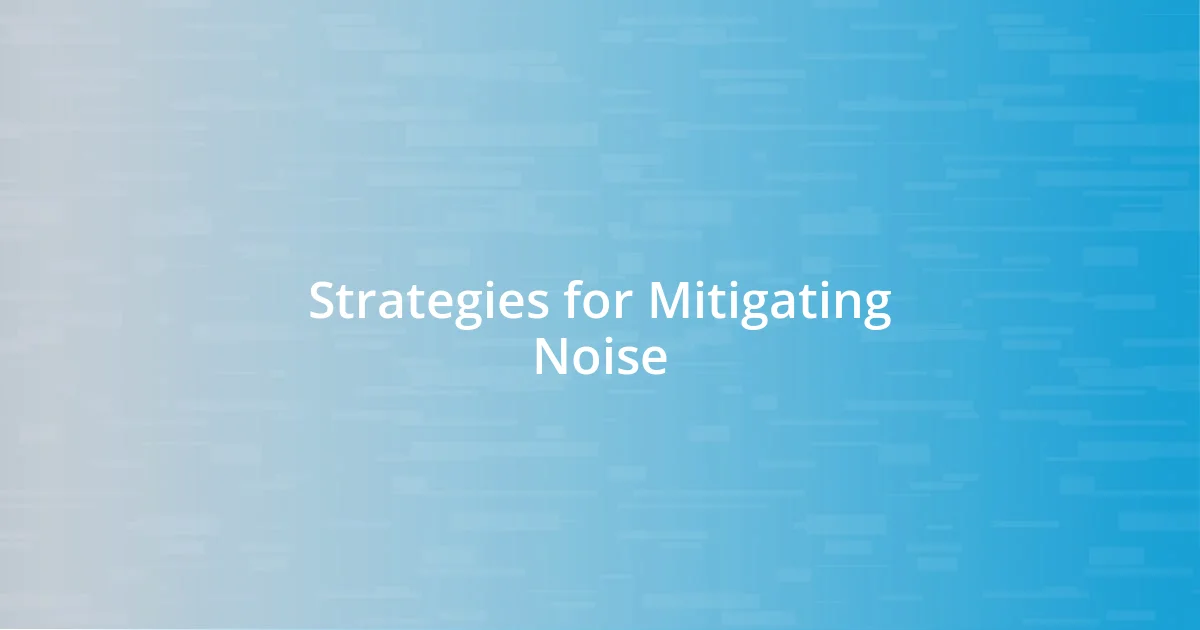
Strategies for Mitigating Noise
Exploring ways to mitigate noise pollution has become essential for maintaining a peaceful living environment. One effective strategy I found is planting trees or adding vegetation. I remember creating a small garden filled with shrubs and flowers, and it amazed me how much they absorbed sound. The lush greenery offered not only a visual retreat but also a natural barrier against the intrusive noise from the street.
Another approach involves soundproofing your home. I once dedicated an afternoon to installing thick curtains and rugs, and the transformation was astonishing. Suddenly, the harsh sounds of honking horns and passing trucks felt muted. If you haven’t tried it yet, consider how much peace you might gain from soundproofing your windows. Wouldn’t it be worth the investment for a quieter home?
Community initiatives also play a crucial role. I recall attending a local town hall meeting where residents voiced concerns about traffic noise. The outcome? A strategic plan to implement noise barriers along busy roads. Engaging in such discussions not only empowers individuals but also drives collective action for sound reduction. Have you ever thought about joining or starting a local initiative? It could make a significant difference in your community.

Using Technology to Manage Noise
In today’s world, technology offers innovative solutions for managing noise pollution, and I’ve experienced some of these firsthand. For instance, I recently discovered noise-canceling headphones, which transformed my focus during busy workdays. The moment I put them on, it felt like stepping into a quiet bubble, allowing me to concentrate in a way that was previously impossible amidst the clamor of urban life. Have you ever found a tool that makes such a difference?
On a broader scale, smart home technology is leading the charge in combatting noise pollution. I remember installing a smart sound monitoring system that tracks decibel levels in my home. The results were eye-opening—it alerted me when external noise spiked, helping me adjust my environment or even my schedule accordingly. The realization that I could manipulate my surroundings through technology opened my eyes to endless possibilities; isn’t it fascinating how a little tech can empower us against overwhelming noise?
In cities, advanced noise barriers equipped with sound-absorbing materials are being deployed along highways and busy roads. I recently took a drive through an area that had implemented these barriers, and the difference was striking. It felt as if the roar of traffic had been turned down to a gentle hum. Experiencing a quieter ride made me realize the importance of investing in such solutions—not just for my peace of mind but for the overall quality of urban living. How often do we overlook the impact of our environment on our daily experiences?
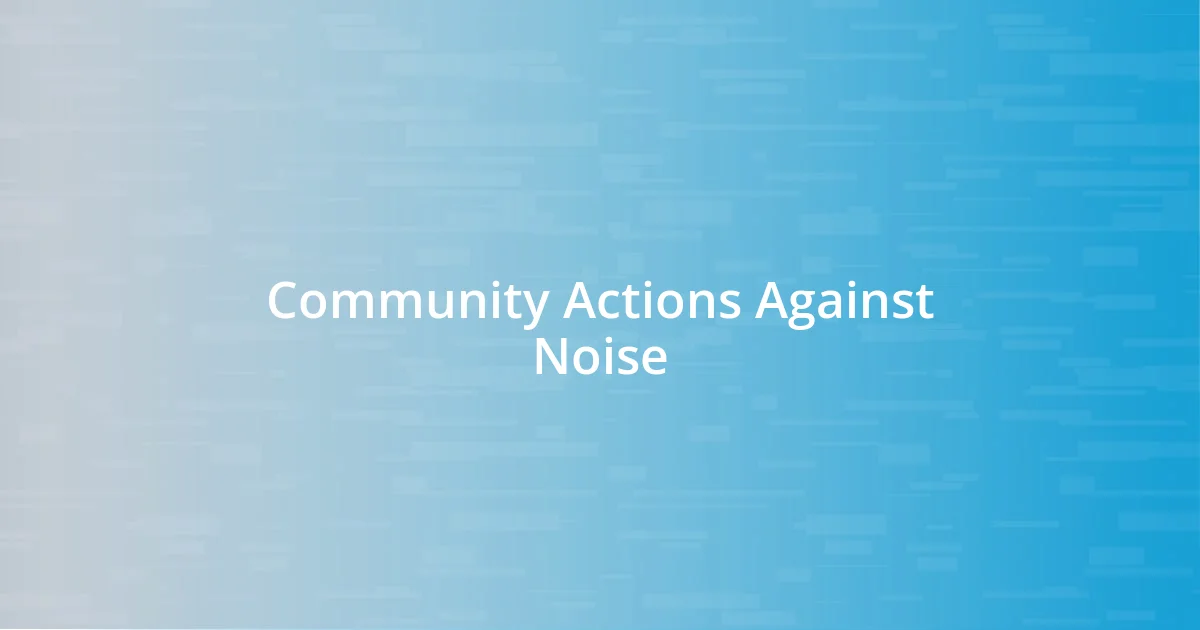
Community Actions Against Noise
Community involvement can be a powerful catalyst for reducing noise pollution. I vividly remember when our neighborhood organized a “Silent Sunday” event, encouraging residents to turn off unnecessary machinery and electronics for a day. The outcome was enlightening; we gathered as families and enjoyed nature without the usual distractions, which made me realize how deeply sound levels can affect our community’s spirit and connections.
Another impactful action is forming noise awareness groups. I participated in a small group that aimed to educate our neighbors about the effects of noise pollution on health and well-being. During our discussions, it struck me how many people had no idea about the connection between chronic noise exposure and stress levels. Through workshops and community presentations, we created a sense of urgency and community spirit that I had never experienced before.
I’ve also seen the benefits of advocacy at a larger scale. After getting involved with a local organization focused on promoting urban green spaces, I was thrilled when plans for a new park included sound barriers and open spaces designed to reduce traffic noise. It reminded me that every voice matters; being part of this process elevated my sense of purpose and connection to my environment. Have you ever considered how your engagement could spark similar changes in your area?


